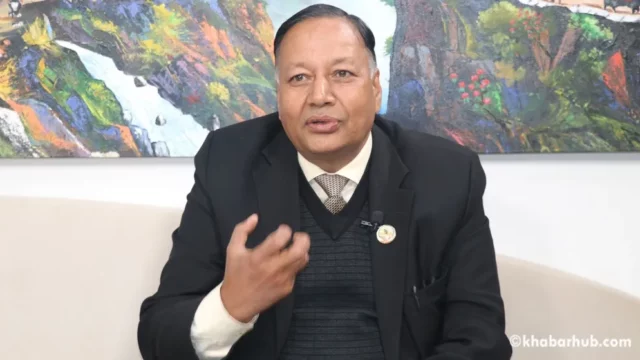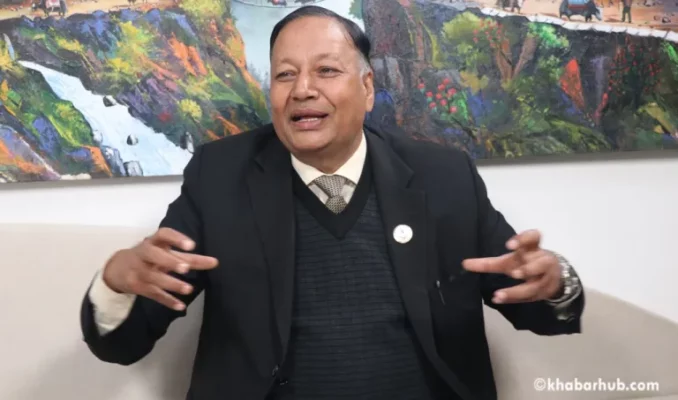KATHMANDU: In a recent public forum, Prime Minister (PM) Pushpa Kamal Dahal, also the Chairman of Maoist Center, critiqued Kathmandu Mayor Balendra Shah.
However, within Dahal’s party, there exists a faction of admirers for Balendra Shah.
Expressing his admiration, Maoist leader and lawmaker Devendra Paudel stated, “I respect Balendra Shah. He emerged through competition, is well-educated, and received support from the people.”
In an exclusive conversation with Khabarhub, Paudel emphasized that Balendra represented an alternative when the party’s conventional approaches faltered. He advocated for a tighter integration of the new generation within the party.
During the two-day visit to Kathmandu from Baglung, we questioned Paudel about the role of parliamentarians in budget and development planning, as well as the prevailing situation in the villages and people’s growing frustration with the government.
When asked about the increasing discontent, Paudel shed light on Prime Minister Pushpa Kamal Dahal’s statement regarding changes in the upcoming budget system.
Additionally, he explained the peculiar scenario where PM Dahal had to leave Chitwan while Rabi Lamichhane emerged victorious, despite notable development in Chitwan.
Responding to inquiries about an impending Cabinet reshuffle, Paudel suggested that the Prime Minister retain the Ministry of Finance and Law.
The conversation with Maoist leader Paudel, a former Education Minister, provides insights into the current political landscape. Excerpts:
Prime Minister Pushpa Kamal Dahal said that there is a concerted effort to spread negativity within the country. The question arises: who and why are they propagating this negativity?
Within the party system, the political parties, having positioned themselves in ruling roles, are expected to oversee the smooth functioning of government affairs.
It is crucial for political parties to collaborate on national pride initiatives such as infrastructure development, electricity, job creation, etc., to instill hope in citizens. Delays in such endeavors are deemed as serious mistakes.
As a member of the House of Representatives, I must address the fact that the first session resulted in the passage of only two laws – one related to the meter badge and the other regarding the budget.
The remainder seems to have been relegated to zero or special time, with a lack of legislative progress.
This failure to enact laws specified by the constitution exacerbates dissatisfaction among citizens.
In transitioning to a party system, political parties must adopt a proactive approach.
Despite the people’s movement of 2062/63, the expected progress in addressing common issues has been slow.
Common problems persist, such as those faced by Sukumvasi, as outlined in manifestos of various parties.
Legislation is essential to address these issues, and the absence thereof contributes to citizen dissatisfaction.
Another notable flaw lies in the political party’s failure to adequately train the new generation.
The earlier generation balanced rights and responsibilities, even going to jail to effect change.
However, the current generation tends to be critical without embracing their responsibilities in nation-building.
The presence of older individuals in political parties, as opposed to younger, skilled individuals, highlights a critical gap in leadership.
In acknowledging the contributions of individuals like Balendra Shah, who entered politics through competition rather than party allegiance, it becomes evident that the new generation must actively engage within political parties.
Rabi Lamchiane and Swarnim Wagle are cited as examples where development did not correlate with electoral success.
At the local level, the youth has demonstrated their capability by winning elections, while some of the older generation within the party faced defeat.
Hence, it is imperative to respect the wisdom of the past generation while urging it to entrust the responsibility of nation-building to the capable hands of the new generation.

The issue of young individuals leaving the country due to poverty is discussed, with an emphasis on the need for political parties to address the root causes.
The critique of the political system should not be an excuse to abandon the responsibility of contributing to the country’s development.
The message is clear: both the political parties and the individuals have a shared responsibility in building the nation.
This plea is extended through the media to encourage a positive and constructive engagement in the nation’s development.
We understand that there have been discussions about a new plan for the upcoming budget in the district. Prime Minister Dahal has mentioned a need to change the budget system. Can you shed some light on what changes the Prime Minister is advocating for?
The current budget system operates in a way where the National Planning Commission sets the ceiling for the budget in the ministry.
After project submission and locking in the Ministry of Finance, parliamentary debates follow.
However, the Prime Minister is emphasizing a shift towards a more inclusive process.
The plan is to discuss the budget during the winter session itself, allowing people’s representatives to actively participate, present issues raised by their constituents, and collectively finalize the budget.
The aim is to foster ownership and transparency in the budget-making process.
What prompted the Prime Minister to advocate for these changes?
The Prime Minister is emphasizing a departure from the current practice of criticizing the Finance Minister after the budget is locked in.
The goal is to encourage a more constructive and collaborative discussion during the winter session.
By focusing on important plans raised by people’s representatives, the Prime Minister aims to create a sense of ownership and understanding even if not every local plan is included in the final budget.
You mentioned discussions in Baglung regarding the constituency’s issues. Can you elaborate on the problems faced by the people in your constituency?
In our constituency, issues like inadequate drinking water, incomplete bridges and roads, limited internet access, and challenges due to the hilly terrain such as landslides and road problems are prevalent.
Additionally, there is a need for more employment opportunities.
While some relief has been provided through programs like the Prime Minister’s Agriculture Program and Employment Program, sustained efforts are required to address these challenges.
The Prime Minister mentioned that voters are not solely voting for development and cited an example from Chitwan. Can you share your perspective on this?
The current political landscape suggests that voters are not solely swayed by development projects.
Historical factors, such as the Maoist movement, still influence voter decisions.
Voters seem more inclined to consider what candidates promise and their connections to societal expectations rather than just focusing on infrastructure development.
It’s crucial to address the needs and expectations of the people to secure their votes.
Why did the Maoists hold a statute conference on February 13?
As a founder of the Maoist party, I believe the statute conference on February 12 (Falgun 1) was essential for introspection and reevaluation.
The party emerged from a movement, emphasizing rebellion and sacrifice.
However, after transitioning to a peace process through negotiations, there was a lack of clarity on managing the organization.
The conference aimed to address the confusion and institutionalize the values of the movement while acknowledging the need for better management within the organization.
Considering the new statute, do you anticipate significant changes within the Maoists?
The new statute alone may not bring about drastic transformations.
It’s not as if the draft we’ve prepared will lead to a radical shift.
What’s crucial here is demonstrating the willpower to implement the changes we advocate.
Our initial revolutionary commitment was to eliminate the monarchy, establish a republic, and craft a statute based on the republic. People resonated with that appeal.
However, for tangible changes, we must communicate to the public our immediate plans for the next chapter.
Statute alone won’t suffice; we need to fortify the internal dynamics of the organization through this process.
Will there be changes in the leadership of the current Central Committee and the Provincial Committee, or will the legislative session have no impact on leadership?
The convention plays a pivotal role in determining the leadership.
Regarding leadership changes, our plan is to conduct a special convention within the next two years.
After the constitution is finalized, a convention will be held.
During this convention, committees will be reshuffled in accordance with the provisions outlined in the constitution.
So, the statute session itself may not directly influence leadership changes; it’s the subsequent conventions that will address these aspects.
Can you clarify if the Maoists now follow a similar electoral competition model for leadership selection, akin to the CPN-UML and Nepali Congress?
The Maoists employ a leadership selection process that differs in nature from the UML and Congress.
While they emphasize full democracy, we advocate for an inclusive, transparent system with class relativity, moving from democracy to centralism.
It’s essential to note that our concept of democracy is centered on centralization based on democratic principles.
After the Maoists entered the peace process, there seemed to be confusion, and it appears this confusion persists. How do you navigate alliances with both the UML and Congress?
During the elections where the Maoists secured 122 seats, there was an opportunity to transition away from rebellion and focus on delivering results.
Unfortunately, we missed that chance by fixating on our revolutionary past instead of paying attention to what we were starting to build.
The current political scenario is driven by the necessity to align with different parties based on the parliamentary landscape.
It’s more of a mathematical calculation than a strategic alignment.
What are your views on the involvement of a third party in forming the government? Traditionally, the first or second party is expected to take the lead.
The third party’s involvement in forming a government goes against parliamentary norms.
Prachanda, due to his adaptability and comfort with various factions, was able to navigate such situations effectively.
However, the recent political turbulence arose when Oli, instead of allowing Prachanda to become the prime minister as agreed, chose to dissolve the parliament.
This deviation from the norm led to a series of complications.
Despite the Maoists’ significant electoral support, the government’s performance has faced criticism. How do you address this?
While the Maoist movement remains a substantial force with 1.2 million votes, the government’s efficacy has been questioned, particularly regarding employment and service delivery.
People express dissatisfaction, citing a lack of job opportunities.
For instance, when Nepalis faced challenges in Israel, the government’s swift response garnered support.
However, consistent delivery of essential services, like providing rice to citizens’ homes, is crucial for maintaining public satisfaction.
The government needs to demonstrate unwavering commitment to the people to address their concerns effectively.
In the course of addressing two or three corruption-related issues, he took an oath of office.
This incident reflected the government’s sincere efforts to foster positive change.
The message conveyed is that the government is actively engaged and has undertaken commendable initiatives.
In various aspects, the government’s role has been perceived positively, generating goodwill among the people.
There is a prevailing belief that such constructive efforts will persist. Contrary to the notion that the government is idle, it is essential to acknowledge that it is actively pursuing various initiatives to meet the expectations of the public.
The Prime Minister has mentioned a cabinet reshuffle. Can you provide insights into when this reshuffle is expected to take place?
The cabinet reshuffle isn’t on the immediate horizon, especially given the upcoming National Assembly elections.
Additionally, there are mathematical considerations within the alliance that must be taken into account.
Coalition consensus needs to be consulted, and if any parties within the alliance decide to part ways, it won’t suffice for just one or two to leave; two other parties must be brought in to maintain the balance.
The reshuffle has to be approached cautiously, factoring in all possibilities, including the risk of another party gaining a majority and jeopardizing the current coalition.
Will the cabinet reshuffle happen after the Congress General Committee meeting on February 19?
The Nepali Congress is not expected to make significant moves immediately.
The agreement, post-Prachanda, is with the Congress for a five-year tenure, with Prachanda in the first stage and Sher Bahadur Deuba in the second.
While there might be internal discussions within the Congress, it’s unlikely for them to deviate from the five-year deal and form another alliance from an institutional perspective.
Will the ministers who left the Maoists be replaced soon?
The likelihood of replacing the ministers who left the Maoists before the statute assembly is low.
There is some groundwork being done by the Prime Minister, but any significant changes will depend on the results achieved.
Two suggestions for the Prime Minister include considering the abilities and qualifications of individuals for key positions.
Certain ministries, such as finance and law, require focused attention to produce tangible outcomes.
The Prime Minister’s directives might face obstacles when interacting with relevant departments due to legal entanglements, highlighting the importance of having competent ministers to navigate such complexities.
Personal experience has shown that the Prime Minister, despite giving instructions, can face challenges, necessitating changes in ministers to ensure a smoother functioning of the government.









Comment